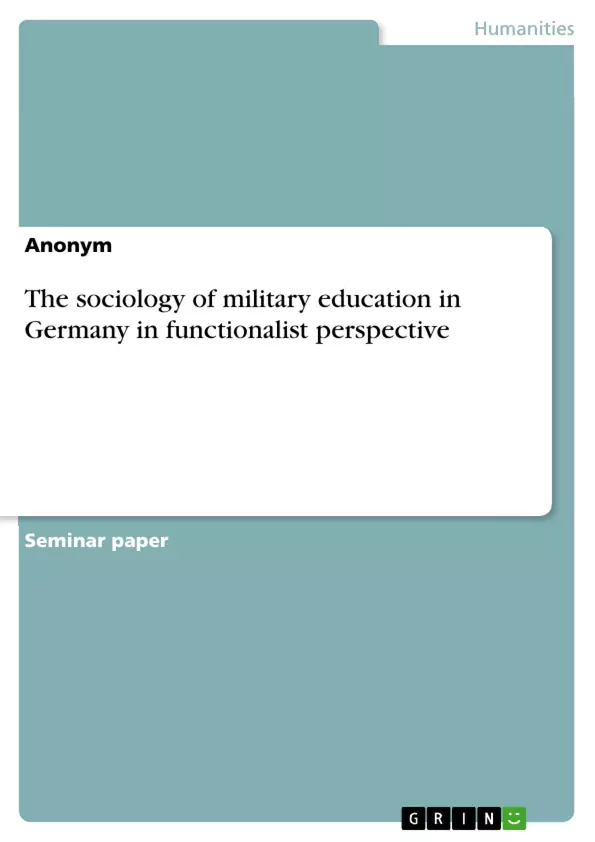This thesis and the question how the reality in Germany is related to military education within society will be answered in this term paper. With the background of the consequences of the Second World War on the view of an army of the German population and the bad acceptance of the Bundeswehr in the society, the view of a military education is a different one, compared to the U.S for example. Unlike in the U.S, where military education is partially integrated into the school system in Germany military education is only provided by the military itself or in small private settings. The aim of this term paper is to find out what is the meaning of military education in German society in functionalist perspective.
“(…) Education must teach people self-discipline; education is essential if society is to remain orderly ”. These pedagogical findings of Èmile Durkheim studies haven’t lost their relevance in our present time when it comes to the question of the meaning and importance of education in our society. These aspects - self-discipline and order - are especially determine in the principles that represent soldiers in the military. This connection should give rise to drawing parallels between military education in a functionalist perspective and the understanding and implementation of it in German society. From the functionalist perspective of Durkheim the aim of education in a society is to produce “ideal adults” in order that to ensure the overriding goal, specifically the functioning and survival of society . Can the values and virtues that can be imparted by a military education and that constitute and should be represented by a German soldier lead the way to the aim of an "ideal adult" described by Durkheim?
Table of Contents
- Introduction
- Definition of terms
- Sociology education in functionalist perspective
- Military eduaction in Germany
- Meaning of military education in German society in functionalist perspective
- Conclusion
- References
Objectives and Key Themes
This term paper aims to explore the meaning of military education in German society through the lens of a functionalist perspective. The paper analyzes how military education aligns with the broader goals of societal order and functioning, as envisioned by Émile Durkheim.
- The role of military education in fostering societal order and stability.
- The influence of historical context on the perception and acceptance of military education in Germany.
- The challenges faced by the Bundeswehr in its relationship with German society.
- The potential for military education to contribute to the development of "ideal adults" as defined by Durkheim's functionalist approach.
- The differences between military education in Germany and other countries, particularly the United States.
Chapter Summaries
- Introduction: The chapter introduces the topic of military education in Germany and sets the stage for the paper's analysis. It highlights the enduring relevance of Durkheim's ideas regarding education and social order, particularly in the context of military training. The chapter also acknowledges the unique historical and social context surrounding military education in Germany, emphasizing the influence of World War II and the subsequent period of pacifism.
- Definition of terms: This chapter provides a deeper understanding of the key concepts central to the paper's argument. It defines "sociology education in a functionalist perspective," emphasizing Durkheim's views on the purpose and function of education in society. The chapter further explores the historical and social context of "military education in Germany," acknowledging the challenges faced by the Bundeswehr in fostering societal acceptance and integration.
Keywords
The key concepts and terms explored in this term paper include military education, German society, functionalist perspective, Émile Durkheim, societal order, Bundeswehr, historical context, pacifism, and acceptance.
Frequently Asked Questions
What is military education from a functionalist perspective?
From a functionalist perspective, particularly that of Émile Durkheim, education serves to maintain social order. Military education, focusing on self-discipline and order, aims to produce "ideal adults" who contribute to the functioning and survival of society.
How does German military education differ from the U.S. system?
Unlike in the U.S., where military education is sometimes integrated into schools (e.g., JROTC), in Germany, it is strictly provided by the military itself or in very small private settings, due to historical reasons and a strong culture of pacifism.
What impact did World War II have on military education in Germany?
The consequences of WWII led to a deep skepticism towards the military within German society. This historical context explains the lower acceptance of the Bundeswehr compared to other nations and the separation of military training from general education.
Can military values help in creating the "ideal adult"?
The paper explores whether values like discipline, responsibility, and order—central to military training—align with Durkheim's goal of education: creating stable, self-disciplined individuals who ensure societal cohesion.
What is the main goal of the Bundeswehr's educational efforts today?
The Bundeswehr tries to balance professional military training with the concept of the "citizen in uniform" (Staatsbürger in Uniform), aiming for integration into a democratic society while maintaining necessary military discipline.
- Quote paper
- Anonym (Author), 2021, The sociology of military education in Germany in functionalist perspective, Munich, GRIN Verlag, https://www.grin.com/document/1173840



